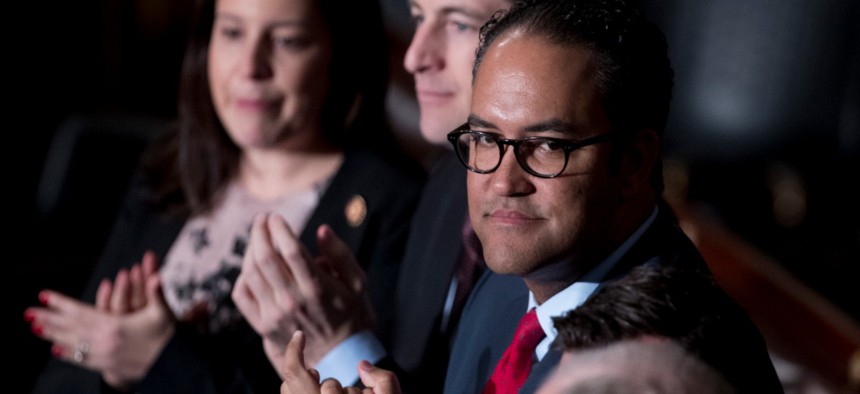Rep. Will Hurd Highlights Plans For Final 14 Months in Congress

ANDREW HARNIK/SHUTTERSTOCK.COM
The Texas congressman laid out his priorities with humor and passion at a summit in Washington this week.
Will Hurd intends to meet a few weighty goals before his final term in the House ends in 14 months—all of which he hopes will vitally boost to the nation’s technological efforts.
During a keynote address Thursday at the Dell Technologies Forum in Washington, the Texas Republican highlighted his ambitious plans: help America gain technological advantages against its adversaries, particularly China; secure the evolving internet of things landscape, and solve the computer science talent pipeline problem by revamping the national education system and creating new opportunities for the current workforce.
“The technological change we are going to see in the next 30 years is going to make the last 30 years look insignificant,” Hurd said. “And we have to be ready for it.”
The three-term congressman is one of the few House lawmakers with a background in information technology and he’s been a vocal proponent for modernization. In August, Hurd announced he would not seek another term, but would instead move to the private sector in hopes of solving the same problems from a new vantage point.
“Now that I’m not running for reelection I can get a few things off my chest,” he joked at the summit this week.
Early in the keynote, Hurd emphasized his viewpoint that, unlike its western counterparts, China is not using facial recognition “to make it easier to buy groceries in the grocery store.” He warned that the People’s Republic of China is working to establish a surveillance state in the northwest region of Xinjiang, which he said it also aims to spread to other regimes across the globe.
“Right now in Xinjiang, the Chinese government has erected a technological surveillance state that has brought Orwellian 1984 into the 21st century. Hundreds of thousands of leaders are being trapped daily for potential disorder and more than 1 million are detained in concentration camps,” he said. “And silence in the West about Chinese use of technology to oppress an entire ethnic group only serves the interest of their Communist Party.”
After providing context on the developing global threat landscape, the congressman said it’s critical that the government lay out a national strategy that prioritizes federal resources and helps advance American leadership across a wide range of emerging technologies impacting lives across the world.
“We have to ensure that America leads in artificial intelligence, quantum and other technologies that will define the course of this century,” he said. Later, he leaned back into emerging technology, adding, “One of the other things I’m going to check off my list in the next 14 months is security vulnerabilities that target the internet of things.”
Hurd noted that by the end of this year, there will be 20 billion connected IoT devices, while simultaneously information is increasing at such a rapid pace, with 90% of the world’s data was created in the last two years. Such an increase in data and connectivity will inevitably establish an entirely new threat landscape.
“We should take advantage of that technology, before it takes advantage of us,” Hurd said.
Hurd and Rep. Robin Kelly, D-Ill., introduced bipartisan legislation to enhance IoT device security and help prevent future attacks on American infrastructure. If passed, the bill would direct the Office of Management and Budget to define minimum security requirements for IoT devices and also create stronger security standards for deploying the technology.
“If you know there’s a vulnerability in the device, what’s your freaking plan before introducing this?” he said. “It’s really simple.”
The congressman added that he is hyper-focused on mobilizing the education, government and private sectors to transform the workforce and education system to adapt to the unprecedented technological progress and rapidly changing economy. He said in his home state of Texas alone, there are 38,000 open computing jobs. But the most recent stats suggest in 2017 only 2,100 graduates earned computer science degrees across the state—and only 19% of them were women, he said.
“We have to prepare our workforce for the disruptions that have been happening since the last industrial revolution and we have to train our kids for 21st century jobs that don’t exist today,” he said.
Hurd suggested introducing computing classes as early as elementary school and noted that students who are introduced to computer science classes in high school are much more likely to choose it as a major in college. He also added that 93% of parents want their children to attend schools that teach computer science, but only 40% of schools offer it as an option.
“That’s a major problem,” he said. “Coding is the language of the future, we all know that. And if students can’t speak it, they will get left behind.”
He also said it’s important to recruit international students to boost the American workforce.
“If China's going to steal our technology, let’s steal their engineers,” he said. “For the students that study at U.S. universities, let’s put a visa in the tube when you get your diploma.”
As he ultimately embarks on the last months of his congressional career, the representative said he’ll stay committed to helping ensure that future technology does not get into the wrong hands and that international deployments of new and budding technologies also meet the values and needs of free societies.
“Unfortunately, we happen to be in an age where our economic and military dominance is not guaranteed, and this new age of leadership in advanced technology is going to determine who sets the rules of the road in our global economy and our international system,” he said. “If America loses its advantage on new technology, it’s going to have a devastating effect on our economy and our national security. We can’t let this happen.”






